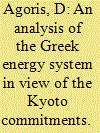| Srl | Item |
| 1 |
ID:
053159


|
|
|
| 2 |
ID:
103605


|
|
|
|
|
| Publication |
2011.
|
| Summary/Abstract |
The possible uses of biomass for energy provision are manifold. Gaseous, liquid and solid bioenergy carriers can be alternatively converted into heat, power or transport fuel. The contribution of the different utilisation pathways to environmental political targets for greenhouse gas (GHG) emission reduction and energy political targets for the future share of renewable energy vary accordingly to their techno-economic characteristics. The aim of the presented study is to assess the different biomass options against the background of energy and environmental political targets based on a system analytical approach for the future German energy sector. The results show that heat generation and to a lower extent combined heat and power (CHP) production from solid biomass like wood and straw are the most cost effective ways to contribute to the emission reduction targets. The use of energy crops in fermentation biogas plants (maize) and for production of 1st generation transportation fuels, like biodiesel from rapeseed and ethanol from grain or sugar beet, are less favourable. Optimisation potentials lie in a switch to the production of 2nd generation biofuels and the enhanced use of either biomass residues or low production intensive energy crops.
|
|
|
|
|
|
|
|
|
|
|
|
|
|
|
|
| 3 |
ID:
192781


|
|
|
|
|
| Summary/Abstract |
E-fuels are a promising technological option to reduce the carbon footprint in the transportation sector. To ensure the renewable origin of electricity-based fuels and minimize the impact of power-to-liquid facilities on the electricity grid, the European Union implemented electricity purchase conditions within the Renewable Energy Directive II. In this work, we analyze the impact of these electricity purchase conditions on the optimal placement, dimensioning and operation of facilities and the German electricity system. The results show that implementing the proposed electricity purchase conditions increases electrolysis capacity by 15.8% and reduces utilization by 672 h in 2030. With the constrained electricity supply, the power-to-liquid facilities concentrate on network nodes with high renewable potential, while the carbon dioxide supply loses importance. Overall, the German electricity system is not heavily affected by the proposed purchase conditions as the required renewable generation capacities only increase slightly. At the same time, carbon dioxide abatement costs rise by 14.3% by introducing the electricity purchase conditions.
|
|
|
|
|
|
|
|
|
|
|
|
|
|
|
|